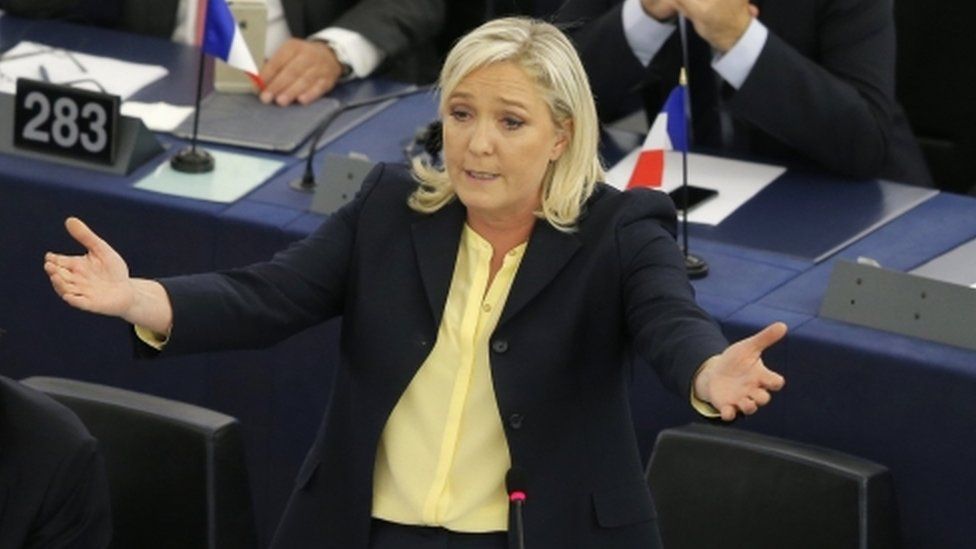Europe may be witness to a new political era
- Published
- comments

The success of Marine Le Pen and the National Front (FN) in France underlines the shifting plates of European politics.
She is far right, anti-Europe and anti-immigration, but many of those who voted for her once voted for the Communists and the Socialists.
She has attempted to reinvent the FN as the party of the voiceless, the left-behind and the angry.
She offers to protect workers' jobs from globalisation and to defend French identity. Her appeal is to a working class that feels disenfranchised.
The centre-right or the conservative right wants to take and hold the middle ground.
In Germany, Angela Merkel is not just in coalition with the Social Democrats - she has also moved to the left.
She agreed to an increase in the minimum wage and, much to the shock of many of her traditional supporters, has welcomed nearly a million refugees.
She is the leader of the European mainstream.
She often declares: "Germany is our homeland. Europe is our future."
She stands for fiscal discipline and a strong Europe built on solidarity. Isolation is no solution in the 21st Century, she likes to say.
Yet a recent poll found that 48% of Germans do not want her to stay as Chancellor, because of the migrant crisis.
In the modern politics, authority can evaporate swiftly.
Rebranded message
In the UK, the Conservatives are out to shrink the state; total public spending is set to fall to 36.4% of national income. And yet, here too, the party is rebranding itself.
The Chancellor, George Osborne, says: "We are now the party of work, the only true party of labour."
He knows that allowing prosperity to trickle down is not enough and plans to raise a National Living Wage to £9 by 2020.
The Conservatives base their appeal on management of the economy.
In these times, the traditional centre-left is struggling.
Peter Mandelson, the former Labour politician and EU commissioner, defined his message in the 1990s as one of social justice and economic efficiency.
But he points out that the "nature of power is shifting, and social democratic parties face a bleak future if we do not come to terms with the shift that is under way."
Adjusting to the shift has not been easy. In Italy, the centre-left under Matteo Renzi is pre-occupied with reforming the Italian state, its political culture, its legal system and its economy.
Timid reforms
In France, under President Hollande, the Socialists have been timid.
They have failed to bring down unemployment or deliver a truly flexible labour market.
The French president has been unwilling to challenge a country nostalgic for what is loosely called the French way of life.
Yet there is widespread agreement that the centre-left has to change and rediscover its message, for in the new politics it is being squeezed by a range of anti-establishment politicians.
The challenge is also there in the US. Hillary Clinton, campaigning for the Democrats' nomination, said: "The defining economic challenge of our time is clear. We must raise incomes for hard-working Americans so they can afford a middle class life."
In France the Economy Minister Emmanuel Macron says the French left "has remained mired in its historical ambiguities; those ambiguities haven't changed".
He wants the left in France to embrace radical change.
"In this country," he says, "…when one succeeds too well, it's indecent and a sign of the most horrible face of capitalism."
He believes the left must be a champion of aspiration.
In the UK, the Labour MP Tristram Hunt says the core purpose of the centre left is combating inequality.
"We need to demonstrate," he says, "much more effectively how inequality blights ordinary lives." He also believes that conversation needs to include the question of class.
The rallying cry of the Labour leader, Jeremy Corbyn, is to oppose austerity and welfare cuts.
His critics say Labour has turned away from being a party of government to a movement of protest and that it no longer reflects the views of the people.
UKIP, strong on English identity, has eaten away at the party's traditional support.
Many on the left were inspired by the election of Alexis Tsipras in Greece in January.
He opposed austerity that had shrunk the Greek economy by 25%.
But despite winning the support of the Greek people, he had to accept further tax rises and cuts or face exit from the euro.
He lost his battle but rallied many on the left who saw the bankers being bailed out while ordinary people carried the weight of the financial crisis.
Many on the left believe the eurozone has adopted a series of rules that cannot guarantee growth.
Loose loyalties
Party loyalties are worn loosely. The centre-right and the centre-left are struggling to define their message.
There is some agreement; many politicians understand the potency of inequality.
But the democracies have not found an answer to the globalised world.
It is an era marked by events that emphasise the powerlessness of those in power - migration, terrorism, the force of change driven by technology.
The mainstream parties are weakened.
It is open season for the Trumps and Le Pens who declare they speak for the people.
Peter Mandelson, part-architect of Labour's victories, speaks of the traditional centre-left being squeezed in the chaotic and incoherent new politics.
The challenge for all parties is how to offer security in a globalised world.
Waiting in the wings are the anti-establishment parties whose route to influence is paved with the disruptive power of social media.
- Published7 December 2015